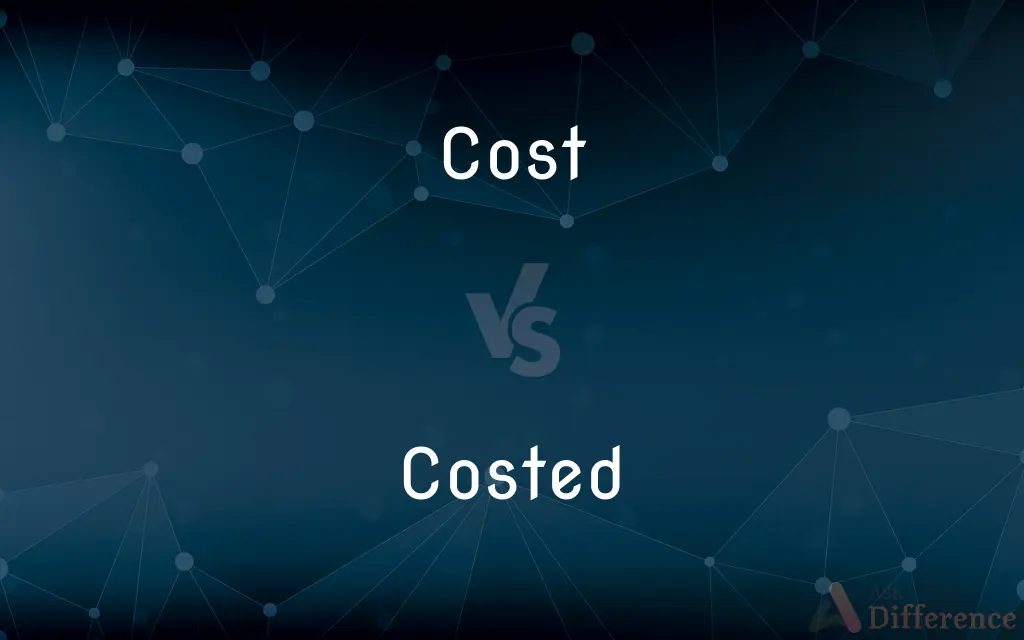Cost vs. Costed — What's the Difference?
By Tayyaba Rehman & Maham Liaqat — Updated on April 4, 2024
Cost refers to the amount required to purchase something or the expense incurred, while "costed" is the past tense of "cost," primarily used in accounting for past expenses.

Difference Between Cost and Costed
Table of Contents
ADVERTISEMENT
Key Differences
The term "cost" is widely used to refer to the price or the expense of acquiring goods or services. It encompasses both monetary and non-monetary expenditures. On the other hand, "costed" is a specific past tense form of "cost," primarily utilized in financial and accounting contexts to denote the action of determining the cost of something in the past.
Cost is a fundamental concept in economics, business, and everyday transactions, indicating what must be given up to obtain something else. Whereas, "costed" applies to scenarios where the calculation or assignment of costs to products, services, or activities has already been completed.
In common usage, "cost" can be both a noun and a verb, serving to describe the amount needed for purchase or the action of calculating this amount. "Costed," however, is explicitly a verb form, used to describe the action of calculating or assigning costs, typically in a past or completed context.
While "cost" is used in both present and future contexts, suggesting an ongoing or upcoming expense, "costed" refers strictly to past actions, indicating that the process of costing has been completed.
Cost plays a crucial role in decision-making processes, helping individuals and businesses to evaluate options and make informed choices. "Costed," by contrast, is often part of a retrospective analysis, looking back at how costs were allocated or determined.
ADVERTISEMENT
Comparison Chart
Part of Speech
Noun/Verb
Verb (past tense)
Usage Context
General, for current or future expenses
Specific, for past expenses or calculations
Function
To indicate price or necessity for expenditure
To denote the action of calculating costs in past
Role in Decision Making
Influential in planning and forecasting
Used in accounting and analysis of past actions
Common Fields of Use
General economics, business, everyday language
Accounting, finance, cost analysis
Compare with Definitions
Cost
The price paid for something.
The cost of the laptop was $800.
Costed
Assigned a price to something.
Each component was costed individually.
Cost
The outlay or expenditure (monetary or otherwise).
The project's cost exceeded initial estimates.
Costed
Analyzed past expenses.
The event costs were costed and reported to management.
Cost
An amount that must be spent or sacrificed.
The cost of success is hard work.
Costed
Calculated the cost of something in the past.
The project was costed at $10,000.
Cost
A measure of resources consumed.
The environmental cost of manufacturing is high.
Costed
Estimated the price for a proposal.
The new product launch was costed carefully.
Cost
The negative consequence of an action.
The cost of procrastination can be steep.
Costed
Determined the financial requirement of an action.
The expansion plan was costed last quarter.
Cost
In production, research, retail, and accounting, a cost is the value of money that has been used up to produce something or deliver a service, and hence is not available for use anymore. In business, the cost may be one of acquisition, in which case the amount of money expended to acquire it is counted as cost.
Costed
An amount paid or required in payment for a purchase; a price.
Cost
An amount paid or required in payment for a purchase; a price.
Costed
The expenditure of something, such as time or labor, necessary for the attainment of a goal
"Freedom to advocate unpopular causes does not require that such advocacy be without cost" (Milton Friedman).
Cost
The expenditure of something, such as time or labor, necessary for the attainment of a goal
"Freedom to advocate unpopular causes does not require that such advocacy be without cost" (Milton Friedman).
Costed
Costs(Law) Charges incurred in bringing litigation, including court fees and charges that may be payable by the losing party, but usually not including attorneys' fees.
Cost
Costs(Law) Charges incurred in bringing litigation, including court fees and charges that may be payable by the losing party, but usually not including attorneys' fees.
Costed
To require a specified payment, expenditure, effort, or loss
It costs more to live in the city.
Cost
To require a specified payment, expenditure, effort, or loss
It costs more to live in the city.
Costed
To have as a price.
Cost
To have as a price.
Costed
To cause to lose, suffer, or sacrifice
Participating in the strike cost me my job.
Cost
To cause to lose, suffer, or sacrifice
Participating in the strike cost me my job.
Costed
Past tense and past participle costed To estimate or determine the cost of
The accountants costed out our expenses.
Cost
Past tense and past participle costed To estimate or determine the cost of
The accountants costed out our expenses.
Costed
Simple past tense and past participle of cost
Cost
To incur a charge of; to require payment of a (specified) price.
This shirt cost $50, while this was cheaper at only $30.
It will cost you a lot of money to take a trip around the world.
Costed
Having a specified (type of) cost
This was a badly costed project.
Cost
To cause something to be lost; to cause the expenditure or relinquishment of.
Trying to rescue the man from the burning building cost them their lives.
Cost
To require to be borne or suffered; to cause.
Cost
To calculate or estimate a price.
I'd cost the repair work at a few thousand.
Cost
Amount of money, time, etc. that is required or used.
The total cost of the new complex was an estimated $1.5 million.
We have to cut costs if we want to avoid bankruptcy.
The average cost of a new house is twice as much as it was 20 years ago.
Cost
A negative consequence or loss that occurs or is required to occur.
Spending all your time working may earn you a lot of money at the cost of your health.
The army won the battle decisively, but at a cost of many lives.
Cost
(obsolete) Manner; way; means; available course; contrivance.en
Cost
Quality; condition; property; value; worth; a wont or habit; disposition; nature; kind; characteristic.
Cost
(obsolete) A rib; a side.
Cost
(heraldry) A cottise.
Cost
A rib; a side; a region or coast.
Betwixt the costs of a ship.
Cost
See Cottise.
Cost
The amount paid, charged, or engaged to be paid, for anything bought or taken in barter; charge; expense; hence, whatever, as labor, self-denial, suffering, etc., is requisite to secure benefit.
One day shall crown the alliance on 't so please you,Here at my house, and at my proper cost.
At less cost of life than is often expended in a skirmish, [Charles V.] saved Europe from invasion.
Cost
Loss of any kind; detriment; pain; suffering.
I know thy trains,Though dearly to my cost, thy gins and toils.
Cost
Expenses incurred in litigation.
Cost
To require to be given, expended, or laid out therefor, as in barter, purchase, acquisition, etc.; to cause the cost, expenditure, relinquishment, or loss of; as, the ticket cost a dollar; the effort cost his life.
A diamond gone, cost me two thousand ducats.
Though it cost me ten nights' watchings.
Cost
To require to be borne or suffered; to cause.
To do him wanton rites, which cost them woe.
Cost
The total spent for goods or services including money and time and labor
Cost
The property of having material worth (often indicated by the amount of money something would bring if sold);
The fluctuating monetary value of gold and silver
He puts a high price on his services
He couldn't calculate the cost of the collection
Cost
Value measured by what must be given or done or undergone to obtain something;
The cost in human life was enormous
The price of success is hard work
What price glory?
Cost
Be priced at;
These shoes cost $100
Cost
Require to lose, suffer, or sacrifice;
This mistake cost him his job
Common Curiosities
Can "cost" be used as a verb?
Yes, "cost" can be used as a verb to indicate the necessity of spending to obtain something.
In which context is "costed" primarily used?
"Costed" is primarily used in financial and accounting contexts to describe past cost calculations.
Is "costed" a common term in everyday language?
No, "costed" is less common in everyday language and is mostly used in specific accounting or financial contexts.
What is "cost"?
Cost refers to the price or expense required to acquire goods or services.
How is "costed" used differently from "cost"?
"Costed" is the past tense of "cost," used in accounting to refer to past calculations or assignments of costs.
Is "costed" always related to past expenses?
Yes, "costed" typically refers to the evaluation or calculation of costs that has already been done.
Why is the term "costed" important in accounting?
It allows for the tracking and analysis of past expenditures, helping in budgeting and financial planning.
What is the difference between "cost" and "price"?
"Cost" refers to the expenditure incurred in producing something, while "price" is the amount charged to the customer.
What does it mean when something "costs" a certain amount?
It means that amount is required as payment to acquire or do something.
Can "cost" be used in future tense?
Yes, "cost" can be used to refer to future expenses, often in planning or forecasting contexts.
How do individuals use the concept of "cost" in decision-making?
Individuals consider "cost" to evaluate the feasibility and desirability of purchases or actions.
Can "cost" refer to non-monetary expenses?
Yes, "cost" can refer to any resource that is expended, including time, effort, or other non-monetary assets.
How do businesses use the concept of "cost"?
Businesses use "cost" to evaluate expenses, set prices, and determine profitability.
How does understanding "cost" benefit consumers?
Understanding "cost" helps consumers make informed purchasing decisions and manage their financial resources effectively.
What role does "costed" play in financial reporting?
"Costed" plays a crucial role in financial reporting by providing accurate historical cost calculations for analysis.
Share Your Discovery

Previous Comparison
Acre vs. Hectare
Next Comparison
Analyzation vs. AnalysationAuthor Spotlight
Written by
Tayyaba RehmanTayyaba Rehman is a distinguished writer, currently serving as a primary contributor to askdifference.com. As a researcher in semantics and etymology, Tayyaba's passion for the complexity of languages and their distinctions has found a perfect home on the platform. Tayyaba delves into the intricacies of language, distinguishing between commonly confused words and phrases, thereby providing clarity for readers worldwide.
Co-written by
Maham Liaqat















































